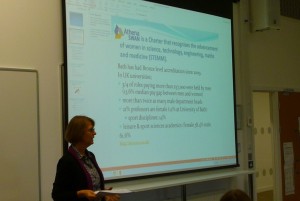Our Department began work on achieving Athena SWAN accreditation in Autumn 2014 and on Thursday 18th December, 2014, we held a forum to launch Athena SWAN as a key priority. 35 staff members participated in round table discussions to identify the benefits of pursuing accreditation, challenges around achieving gender equality and fostering an inclusive workplace culture for all. Our process is also part of the University of Bath Athena SWAN plan (Bronze Award).
Prof. Simone Fullagar, Chair of Athena SWAN DSAT, led a presentation to the Department about the Athena SWAN Charter and the importance of addressing gender equality in sport and health disciplines as well as university careers more broadly.
In 6 multidisciplinary groups, Department staff discussed the benefits of being involved in the Athena SWAN programme and current challenges to gender equity. Discussions exposed how women (and men) from different social backgrounds (ethnicity, gender, sexuality, religion, disability, class) are already creating awareness about ‘unconscious bias’ and the need for active inclusion.
Ideas for action to improve gender equity
- Identify effective communication processes to engage all staff, provide information about how to join committees, create social spaces for interaction and informal networking.
- Continue to promote degree programmes at the University of Bath to women and people from equity groups. In 2013/14 Bath sport science & sport social science programmes had the highest proportion (43%) of female undergraduate students when benchmarked against similar universities and the whole sector (33%). The Foundation sport course was lower at 31%. There are few students from minority backgrounds.
- Address organisational barriers – by managing short-term contracts and encouraging goal setting & career development processes for all staff. Involve more women in research governance, decision making and grant applications.
- Support research time and promotion pathways – by reducing administration, supporting mentoring for all staff, identifying gender related issues that may not have been recognised (eg., student responses to male/female lecturers in evaluation)
- Promote flexible working across all roles to enable carer responsibilities of all kinds -- by recognising part-timers equally in terms of contribution, encouraging parental leave for mothers and fathers, supporting plan for parents returning from parental leave to minimise career disruption, addressing waiting lists for nursery and discussing work-life balance strategies
- Consider proactive gender equity stratgies in recruitment – by examining how to attract and retain more women in areas where there are more men, considering pros/cons of gender blind shortlisting and including diverse images of women and men in all Dept marketing
Respond



